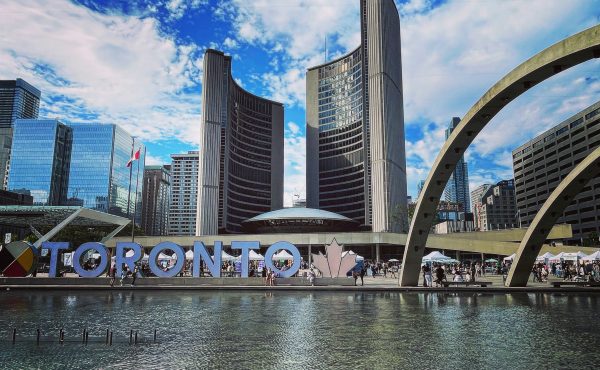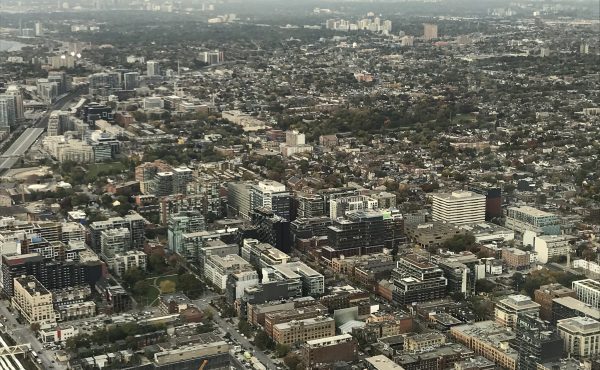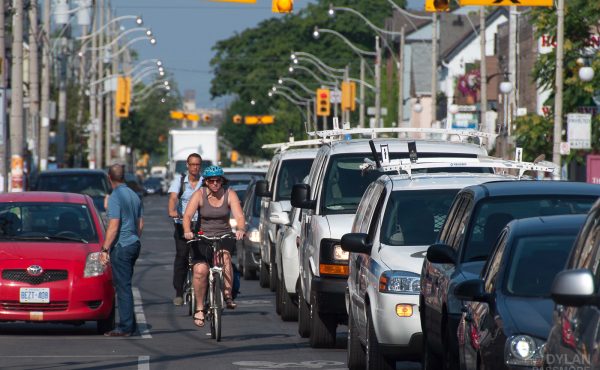Continuing my series from last week on potential revenue tools to pay for transit in the Greater Toronto and Hamilton area, today we come to a regional gas tax.
In the United States, gas taxes are dedicated to transportation infrastructure. Adding a regional gas tax in the GTHA could be one way to raise money for GTHA transit infrastructure.
Amount charged
The CivicAction report (PDF) estimates that a 10-cents/litre gas tax in the GTHA would raise $1 billion a year. As vehicle fuel efficiency increases, it is possible that this amount would decline over time.
Cost to implement
Rating: good
The infrastructure is already in place to collect gas taxes. The province would collect the additional tax and send it to Metrolinx.
Behaviour incentives
Rating: Good, but …
A gas tax was once quite a good proxy for total road use by individual drivers, but as a wider range of very fuel-efficient vehicles have emerged, that effect has been reduced.
A gas tax is certainly a great way to reduce people’s gas consumption. One way to achieve that is to drive less, but another way is to use a more fuel-efficient vehicle (both of these have been happening as gas prices have risen in recent years). While reduced fuel emissions are desirable for other reasons, they do not reduce congestion.
Still, most people do not buy a new car all that regularly, and most vehicles on the road are still primarily gas-fuelled, so some reduction in driving would result. This reduction would take place across the board, rather than being focused on the most congested areas and times, but would still likely reduce congestion somewhat. In turn, it would increase transit use at all times of day (transit use has been increasing along with gas prices in recent years), which would be a benefit.
The negative behaviour associated with a regional fuel tax is that people will drive outside the region to fill up in order to escape it. While no doubt gas stations would crop up right outside the tax boundaries, the GTHA-wide nature of the tax would mean that for most people, it would not save money to drive the distance required to escape the tax.
Political viability
Rating: mixed
One might think that, with gas prices fluctuating wildly, a gas tax inserted into the price would hardly be noticed by motorists. However, the amount of tax required to raise a billion dollars a year – 10 cents/litre – is substantial. Given that people dependent on driving are already being seriously affected by the underlying steady rise in gas prices in recent years, a hike of this magnitude would likely create a strong backlash.
The fact that gas is already subject to specific additional taxes by the federal and provincial governments is also a source of resistance to additional taxes on gas. A small portion of the federal gas tax is already distributed to municipalities to assist with transportation costs, although it comes nowhere near to covering the costs of the transportation infrastructure cities are responsible for building and maintaining.
Some people also have equity concerns about the gas tax. In Toronto, a lot of low-income jobs and low-cost housing are in the suburbs, with no decent transit between them, so many low-income people need to drive. Since the gas tax is fixed, it imposes a disproportionate burden on low-income people (or professions such as taxi and truck drivers) who have little choice about driving.
A smaller tax, especially if introduced during one of the brief fluctuations when gas prices are dropping, might be more viable. People are already accustomed to paying a tax on gas, and quite a large portion of the population is concerned about the effects of fuel consumption on the environment. However, a smaller tax would mean that additional types of taxes or fees would need to be imposed to make up the difference.
What do our readers think of this option? What are some of the other issues, positive or negative, with a gas tax?
Tomorrow: Regional Sales Tax






5 comments
I’d hope the raise of gas tax happens at provincial level, and the money raised stays in local community for infrastructure upgrade. Then in GTHA, the money could be mostly focused on transit, but leave a slice for road/bridge repair and so on as a way to placid to the drivers.
I think you need to consider the fact that although fuel efficiency in vehicles is indeed improving, the gains here are off-set by the growing number of individuals who own private automobiles. I think if anything this amount of revenue will increase, not decrease as you have suggested.
Consideration also needs to be given to who is buying these vehicles, while a household may not purchase a new vehicle all that often, much of the GTHA’s population growth can be attributed to immigration. Most individuals immigrating to this area will not be bringing person vehicles with them, but rather purchasing one here should they decide a vehicle is needed.
I also feel like this would not be politically viable, as people who drive their cars will undoubtedly be unwilling to fund something (i.e. transit) that they do not use themselves.
In response to Marisa’s conclusion, people who drive their cars benefit from a service they themselves do not use (namely, transit) because TTC operations reduce road congestion, traffic accident occurrences, pollution and carbon emissions.
When Dylan Reid looks into the size of a proposed fuel tax increase, he should be comparing it to the substantial taxes that are already standard in Western Europe, and help fund transit systems which Toronto should emulate.
That a fuel tax increase will put pressure on taxi drivers and truckers is all for the best. This will contribute to shifting business away from them – towards environmentally sustainable transit and rail freight.
While adding a 10 cent per litre gas tax would result in a backlash, this could be done by phasing it in over just a few weeks. Gas prices fluctuate six nights a week, so adding 2 cents once a week for five weeks would make it far easier for the public to swallow, particularly when the odd increase in tax would co-incide with a drop in the pump price.
CALVINHC,
there is no point hiding it. Drivers will find out. Gas station will have big poster to remind them that new tax is making price higher, and talk radio show will talk about it all day long. Better be upfront about what you are doing and why you are doing it.
Don’t get me wrong, phasing it in is OK, but that would be over years, instead of weeks if you really want to soften to blow.